The Theatre
[" APPEARANCES." BY GARLAND ANDERSON. AT THE ROYALTY THEATRE. " THE LION TAXER." BY ALFRED SAVOIR. AT THE GATE THEATRE STUDIO. " HONOURS EASY." BY ROLAND PERTWNE. AT THE ST. MARTIN'S THEATRE.]
As the curtain rises at the Royalty a dark figure, just seen to be in uniform, advances in the dim light and tells the audience that he represents the author.
The author, like the speaker, is a negro and was a bellboy. He was a bellboy with faith—faith in himself, faith in the Good. He therefore believed that he could write a good play. He wrote this play. There is • something wrong with the logic. But we are at once completely disarmed. - For it now appears that if we condemn or criticize Appearances we shall not merely be criticizing a play but also undermining a belief ; a good, simple man's simply harmless belief in the triumph of well-meant will-power. So we don't criticize. We watch ; and see the imaginary, coloured bellboy triumphing (in the play) over a plot against his reputation like that which the real bellboy (the author) actually defeated in life. A white woman stopped him in the street, demanded money, threatened to accuse him of assault. He relied upon a favourite maxim culled (we gather) from a matrial steadily studied in the intervals of
bellboyish duties. It asserted—alas, against so much evidence lthat " nothing 'can fight against the Good,",
So the wrongly accused boy did not fight. He murmured the truth in the gentle charming voice of Mr. Darin Shindell —a little too throbbingly emotional in this part.- He told
it and waited. . ' _ , _ We cannot help seeing. that he might have waited in gaoli for months and months, had not it hugely surprising series of eleventh-hour revelations and repentances precipitated his vindication, at the end of a long trial scene, enlivened by the magnificently humorous and natural acting of another negro, Mr. Doe Doe Green. This witness also tells the truth with an emphasis all the more convincing because he hasn't (apparently) always told it, and isn't a complete pattern of all the persecuted virtues. A great moment, in a play not great, certainly ; but far above the powers and faiths of most bellboys, of whatever colour and complexion. -
About four years ago an account was given in this column of the original production, by Gaston Baty in Paris, of Alfred Savoir's symbolist farce, Le Dompteur. The Gate Theatre has now won a great success by an English version of this very amusing play: Mr. Ernest Thesiger has the part of the English milord, who represents ideals or spirit,-pitted against the appallingly real mass of matter embodied in the huge frame of a circus lion-tamer. He plays it much less blandly, much less impassively, than the French actor did. I daresay he is right, and, anyhow, it is the height of comic joy to see him, his face convulsed by disgust, watching the lion-tamer's meaty British breakfast ; matter reinforcing itself impenitently, while fancy and imagination murmur in anguish " What a dreadful man 1" Yes, indeed 1 These torturing incompatibilities ! But " the show goes on," and it is run, if not by lion-tamers, at least by shepherds who are " dreadfully " inconsiderate of sheep ; as of vegetarians, humanitarians, dreamers and poets.
In Mr. Pertwee's new play at the St. Martin's there is an exciting collision of many plots which cannot be dis- entangled in small space. They are all stimulating and are recounted in a sharp, monosyllabic dialogue, admirably matched with their brightness. Principally (after a deliciously dazed impression) one recovers a melodramatic tale of rivalry between two magnates—one, a roughish rascal, heavy in Mr. Norman McKinnel's best business-mannish manner ; the other, more affable in Mr. Allan Aynesworth's suave " good form." There is another collision—between these two eminent actors' style and the slap-dash manner of the younger members of the cast. Why not '1 The whole doesn't perfectly harmonize, nor do the two generations who meet in the confusion of adventure. I cannot omit a few words of praise- for the eminently Edwardian performance of Mr. Morton Selten, as a polished plus-foured colonel, who strolls, without much purpose, through a few of the com-


















































 Previous page
Previous page